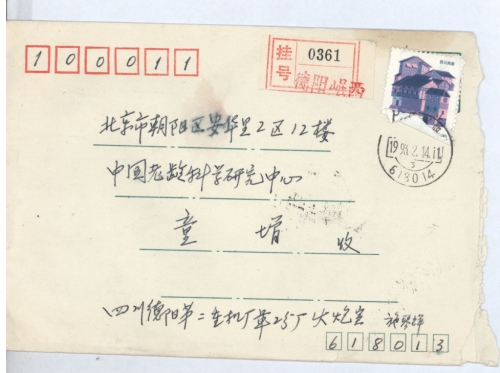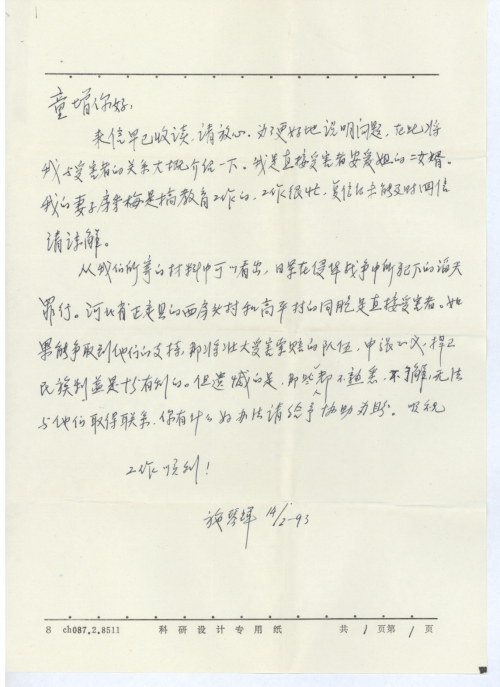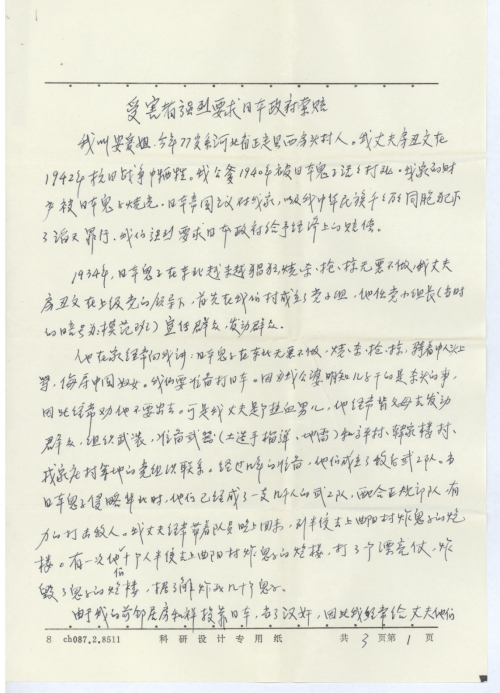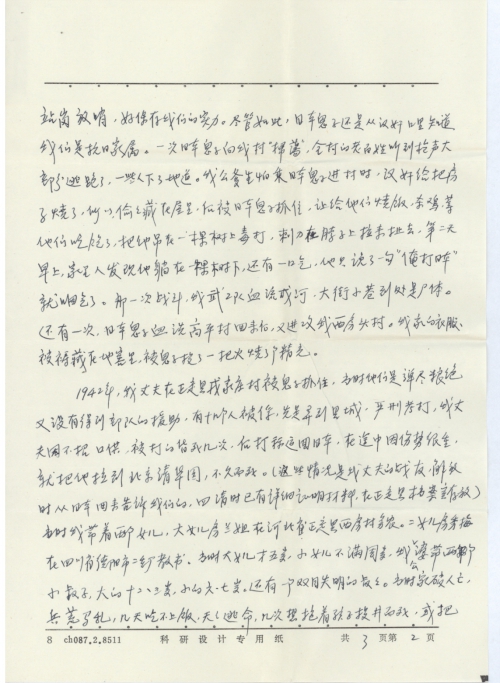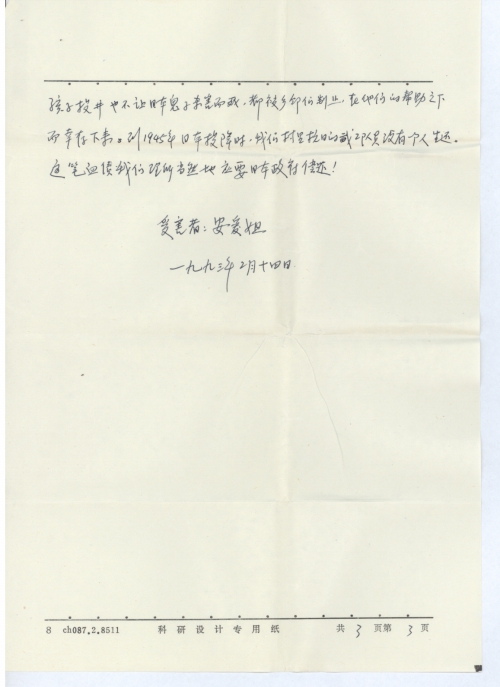Date of letter:1993-02-14
Address of author:Deyang City, Sichuan Province
Date of event:1940, 1942
Location of event:Zhengding County, Shijiazhuang City, Hebei Province
Name of author:Shi Qinhui (An Aijie’s son-in-law),An Aijie
Name(s) of victim(s):Fang Chouwen (An Aijie’s husband), An Aijie’s father-in-lawType of atrocity:Murders, Others(MU, OT)
Other details:Regardless of our efforts to persuade him not to, my husband resolutely took part in the War of Resistance Against Japan. He was captured by the Japanese soldiers and was tortured cruelly. He was injured so seriously that he died soon. When the Japanese soldiers mopped up in our village, they caught my father-in-law. The Japanese soldiers forced him to cook for them. After they were full, they hung my father-in-law on a tree and beat him. They even bayoneted him in the neck repeatedly, and tortured him to death. My family was ruined by the Japanese invaders. I have the right to require the Japanese government to compensate for the debt of blood.
Tong Zeng,
How are you?
I received and read your letter a while ago; please be rest assured. First, to better explain the case, I would like to clarify my relationship with the victim. I am the second son-in-law of the direct victim An Aijie. My wife Fang Xiumei works in the education industry, so she is too busy to promptly reply to your letter. Sorry for the delay.
It can be seen from the materials we sent you that the Japanese army committed heinous crimes in Japan’s war of aggression against China. The people of Xifangtou Village and Gaoping Village, Zhengding County, Hebei Province are direct victims. If we can win their support, it will be very beneficial for expanding the number of claimants, pursuing justice and defending national interests. Unfortunately, we are not familiar with those people and cannot get in touch with them. Do you have any good suggestions? Please help us.
Wishing you success in your work!
Shi Qinhui
February 14, 1993
Victim Strongly Demands Compensation from the Japanese Government
I am An Aijie, 77 years old, born in Xifangtou Village, Zhengding County, Hebei Province. My husband Fang Chouwen died in 1942 during the War of Resistance against Japanese Aggression. My father-in-law was beaten to death by the Japanese devils in 1940. My family’s property was burned down by the Japanese. The Japanese imperialists committed heinous crimes against my family and other tens of thousands of compatriots. We strongly demand economic compensation from the Japanese government.
In 1934, as the Japanese army committed rampant crimes including burning, killing, robbing and looting in northeastern China, my husband Fang Chouwen, under the leadership of the upper-level of the Communist Party, set up a Party team in our village, with himself as the head of the team (with the code: model squad). The team was responsible for publicity and mobilizing the people.
At home, he often told me, “The Japanese committed all kinds of crimes such as burning, killing, robbing and looting in northeastern China. They rode on the heads of and curse the Chinese people and insult Chinese women. We are planning to fight the Japanese.” As my father-in-law and mother-in-law knew their son was doing something that would get him killed, they often tried to persuade him not to go outside. But my husband was a passionate man. He often secretly mobilized the people, organized military forces, prepared weapons (homemade grenades, mines) and contacted the Party organizations in Gaoping Village, Hanjialou Village and Rongjiazhuang Village without letting his parents know. After years’ preparation, they set up an armed work team in the enemy’s rear, which later expanded to thousands of members when the Japanese army invaded northern China. They cooperated with the regular forces in vigorously fighting the enemy. My husband often brought team members home at night and they would go to Quyang Village to bomb the forts of the Japanese army in the middle of the night. One time, a dozen team members including my husband fought a good battle in the middle of the night. Not only did they demolish a fort of the Japanese army at Quyang Village, the bombing also killed dozens of Japanese soldiers.
As our former neighbor Fang Hexiang surrendered to Japan and became a traitor, I would often stand guard for my husband and other team members to protect their strength. Nevertheless, the Japanese army still knew from the traitor that we were family members of resistance fighters against the Japanese. One time, the Japanese army raided my village. After hearing gunshots, most of the villagers fled and some hurried into the tunnel. My father-in-law feared that the traitor might burn our house after the Japanese entered the village, so he hid in the house. Later, he was discovered by the Japanese soldiers and ordered to kill chickens and cook for them. After the Japanese soldiers had enough food, they hung my father-in-law on a tree, brutally beat him and pulled and pushed a bayonet against his neck. On the next morning, we went home and found him lying under a tree. After saying with difficulties, “I will fight the Japanese”, he died. In that battle, my husband’s armed team suffered great casualties and there were corpses all over the streets and alleys. In addition, once, the Japanese army attacked Xifangtou Village after an orgy of bloodshed in Gaoping Village. A Japanese soldier set fire to my family’s clothes and quilts hidden in the cellar and burned them down all to ashes.
In 1942, my husband was captured by the Japanese soldiers in Rongjiazhuang Village, Zhengding County. As their armed team ran out of bullets and food, without assistance by the regular forces, over 10 team members were captured. They were first escorted to the county, where they were brutally tortured. As my husband refused to confess, he was beaten so badly that he blacked out several times. Later, the Japanese army planned to transport them to Japan. But due to serious injuries, my husband was taken to Qinghuayuan, Beijing and he died before long. (The above information was told to us by my husband’s battle companion who returned from Japan after the People’s Liberation. There are detailed certification materials stored in the archive of Zhengding County). Back then, I took care of two daughters all by myself. Now, my older daughter Fang Lanjie is a farmer in Xifangtou Village, Zhengding County, Hebei Province and my younger daughter Fang Xiumei is a teacher in Erzhong Factory, Deyang City, Sichuan Province. Back at the time, my older daughter was 5 years old and my younger daughter was less than 1 year old. My father-in-law and mother-in-law took care of two brothers-in-laws, the older one was 12 or 13 and the younger one was 6 or 7. And there was a blind uncle. Back then, the family was torn apart. In the war, we did not have food to eat for days and had to flee for life every day. I wanted to commit suicide by jumping into a well with my children several times, or I would rather throw my children into a well than let them be killed by the Japanese devils. But other countrymen stopped me and with their help, we survived. When Japan surrendered in 1945, not a single member of the armed team of my village survived. We have every right to demand that the Japanese government repay the debt of blood!
Victim An Aijie
February 14, 1993














